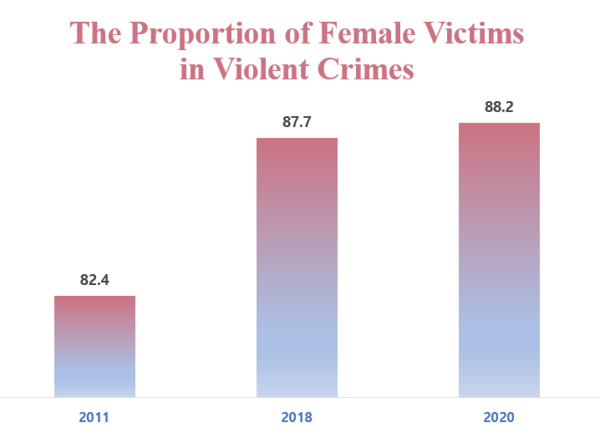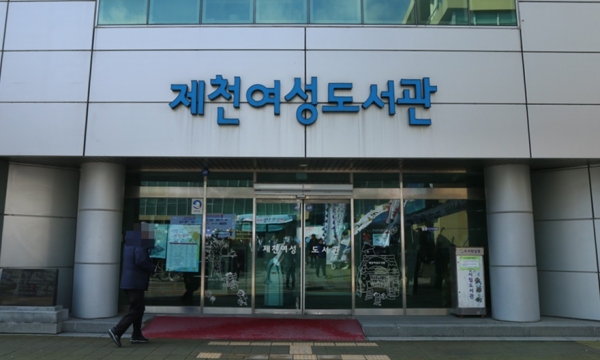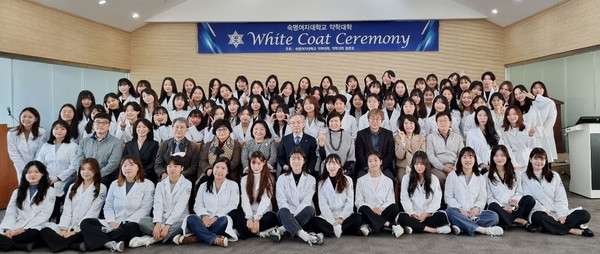
In May 2022, Gamrae, a women-only restaurant located in Cheongpa-dong, Yongsan-gu, disclosed its difficulties in running the restaurant through its SNS account. CCTV in front of the restaurant showed two men peeping at the restaurant and taking pictures in front of it. In addition, it is said that it is often possible to see people who deliberately visit and hover around the restaurant to pick a fight. On the other hand, there are also some questions about the need for women-only spaces.

Women-only parking space
Background of the women-only concept
Women-only spaces in Korea have been appearing since the 1990s. It is known that women's rest areas were provided on campuses, considering women as socially disadvantaged people who could be excluded and discriminated against due to the social structure. At that time, it was men who accounted for the majority in universities, and therefore male students dominated the mainstream culture of universities. For women excluded from this male-dominated society on campus, universities provided women's rest areas for women to talk and relax in comfortably. It seems that society at that time was beginning to recognize the problem of women being excluded or made to feel uncomfortable. Starting with women's rest areas, each local government in Korea has expanded women-only spaces since the 2000s by the "Creating a Women-Friendly City" project for women's safety. In 2009, the Seoul Metropolitan Government set up parking spaces for women as part of the "Women's Happy City Project." It was implemented to prevent crimes against women in parking lots. In addition, in 2011, the Seoul Metropolitan Government's "Women's Safety Net Policy" was implemented to provide services so that women can return to their home safely at night. This expansion of women-only spaces and services by public institutions began with the goal of keeping women exposed to crime safe.
Today, women-only spaces are expanding not only in the public sector but also in private workplaces. In addition to residences such as women-only accommodations and share houses, it is also expanding in the field of education and health, with women-only study cafes, private study rooms and women-only gyms. One woman who uses a women-only gym in Gyeonggi-do said, "When I used to go to a unisex gym, I didn't use the dressing room, but since this is a women-only facility, I am able to use it without worrying that someone will peek."1) In other words, women-only spaces can alleviate anxiety or the fear that they can be exposed to crimes or violence. It means that women usually use women-only spaces to keep themselves safe from danger. On the other hand, some argue that women-only spaces are discrimination against sexes other than women. Due to the nature of women-only spaces, people are not allowed except for women. These opposing views on women-only spaces are bringing the matter up today.

The proportion of female victims in violent crimes
Women's voices, caused by social context
The discussion of women-only spaces was found to have affected recent policy changes. On August 20, 2022, the Seoul Metropolitan Government announced that it would remove women's parking spaces in consideration of their lack of effectiveness. Also, it said it would convert them into "family-first parking spaces" for pregnant women, people with infants and those with difficulties in moving. Some evaluate it as a decision that considers not only women but also those with various transportation vulnerabilities. On the other hand, some say that it is necessary to judge its appropriateness by considering the purpose of installing women's parking spaces. Regarding the abolition of the women's parking spaces, one woman said, "As it is a place where CCTVs are operating, it will be helpful for female drivers to identify the criminal quickly if a crime occurs."2) This position believes that the spaces are still necessary for women who are likely to be exposed to parking lot crimes. The Seoul Metropolitan Government Ordinance on the Installation and Management of Parking Lots for Women suggested guidelines that women's parking spaces should not be in CCTV blind spots and should be placed near to the parking booth. This shows that crimes against women occur frequently in parking lots, so they should be installed in spaces where CCTV can film and not in isolated areas. According to crime statistics reported by the National Police Agency in 2021, which show the location of crimes in 2021, 26,553 crimes occurred in parking lots, of which 21,306 included violence, theft, and other violent crimes. In addition, out of the 188 violent crimes, 113 cases of rape and molestation occurred against women. This means that parking lots are a serious crime zone and suggests that women still need to be protected from crime with women's parking spaces.
Given that crimes against women do not occur only in parking lots, the expansion of women-only spaces seems inevitable. According to the crime analysis statistics of the Supreme Prosecutors' Office, the proportion of female victims in violent crimes such as murder, robbery, and sexual assault has been steadily increasing from 82.4% in 2011 to 87.7% in 2018 and 88.2% in 2020. In other words, almost 9 out of 10 victims of violent crime are women. This increase in violent crimes against women is seen to serve as a factor in increasing the demand for women-only facilities. In this regard, Yoon Jiyoung, a professor at Changwon National University, said, "It shows that our society has failed to provide a safe environment for women. Women are very concerned about being victims of sex crimes that can happen anytime, anywhere. For example, illegal filming could be conducted anywhere, using hidden cameras, not only in public restrooms but also in libraries, hotels, and even at home."3) In this respect, women-only facilities are believed to have originated from women's need to be protected from various kinds of crime. Also, women can be easily exposed to sex crimes because those types of crimes, such as illegal filming, can occur in places where people can't recognize it is happening. Recently, digital sex crimes in which illegal videos are shared are increasing. According to the 2021 Digital Sex Crime Victim Support Report released by the Women's Human Rights Institute of Korea in 2022, a total of 10,353 cases occurred in 2021, which is an increase from 6,983 in 2020 and 4,114 in 2019. It indicates that the places where women can be easily exposed to crime are increasing.

Women-only library in Jecheon
Listening to others' opinions
Women-only spaces are being installed not only to prevent crimes against women but also to eliminate discrimination against women due to the social structures. The Women's Library in Jecheon, which opened in 1994, is a women-only facility created with the donation from Kim Hakim. She donated about 1.1 billion won worth of land to build an educational institution to resolve the problem of the educational gap she felt as a woman. Accordingly, the Jecheon Metropolitan Government spent about 800 million won to establish a women-only library. It shows this library was created to bridge the educational gap between women who have been socially discriminated against in education. Contrary to the intention, a man filed a petition with the National Human Rights Commission of Korea (NHRC) in 2011, claiming that men were being excluded. In response, the petition was approved and the NHRC recommended that men not be excluded from using such facilities. It was stated that considering the purpose of public libraries, where knowledge and information can be shared with anyone, various people should be allowed to use them. At the time, NHRC said, "It is desirable to find a solution for all members of our society to develop together amid the changing times in which the value of diversity has become important."4) In other words, it was argued that creating a society where men and women harmonize and develop is in line with the trend of the times. However, this ruling which presupposes that gender discrimination has disappeared today and our society has achieved gender equality seems to be controversial. At that time, the library accepted some recommendations from the NHRC and decided to allow men to borrow books from July 2021. Meanwhile, library users demanded the suspension of the book loan service for males through a national petition, considering the original aim of bridging the educational gap among women who had been alienated from the education field. They seem to have recognized that women-only libraries should be provided according to the purpose of their establishment for women.
In addition to women-only libraries, women's education institutes are also considered women-only spaces. Women's professional education institutions were created in the past after recognizing the problems of male-dominated university culture and education, and they aim to foster and educate female talent in various fields. Some say that such women's professional education institutions interfere with men's college entrance and career choices. Meanwhile, in 2019, the Ministry of Education announced a university quota adjustment plan to allocate about 18% of the nation's pharmacy college quota to women's universities. Currently, the total quota of 37 pharmacological universities in Korea is 1,693. Four of the 37 universities will have a total of 320 students from Duksung, Dongduk, Ewha and Sookmyung Women's University. Some men preparing to study pharmacy argued that they are excluded from 18% of universities, which violates their freedom of career choice and the right to equality, so they filed a constitutional complaint. However, in 2020, a constitutional decision with a unanimous opinion rejected this complaint because the average percentage of female students attending coeducational pharmacies had reached 50%. This ruling shows the Constitutional Court of Korea's position that it is difficult for women's universities to affect men's chances of entering a pharmacy program. The Court also explained that "The Ministry of Education considered the experience and assets of women's university pharmacology colleges accumulated while running pharmacology colleges for a long time."5) This proves that there is a legitimate purpose to allocating a certain number of pharmacology colleges to women's universities. Therefore, the expansion of women's opportunities for entering pharmacy programs does not reduce men's opportunities. In this respect, it seems difficult to judge that women-only spaces and facilities exclude or discriminate against other sexes.

College of Pharmacy of Sookmyung Women's University
To understand social context correctly
Women-only spaces were created to prevent crimes against women. The use of women-only facilities by women who are worried about crimes against women stems from their desire to protect themselves. To this point, women-only spaces have continued to develop from various contexts and have demonstrated their worth. In this context, it's necessary to grasp that women-only spaces do not violate the rights of genders other than female.
1) Kim Jungwoo, "Expansion of Women-Only Spaces Such As Gyms and Private Study Rooms... Controversy Arose Over Reverse Discrimination", Edaily, November 5, 2020
2) Park Yunmi, "[I Asked O People] "It's 'Women's Priority', Not Called 'Women-Only'"", Popcorn news, October 5, 2021
3) Lee Hyojin, "No Men Allowed: Women-Only Spaces Increasing in Korea", The Korea Times, September 22, 2022
4) Jin Hyemin, "The Donor Asked for a 'Women's Education Institution'… the Human Rights Commission Regarded It as Male Discrimination", The Women's News, July 5, 2021
5) Jang Pilsoo, "Constitutional Court, "Allocating the Number of Students to Women's Universities, It's Not Gender Discrimination"", The Hankyoreh, July 24, 2020


